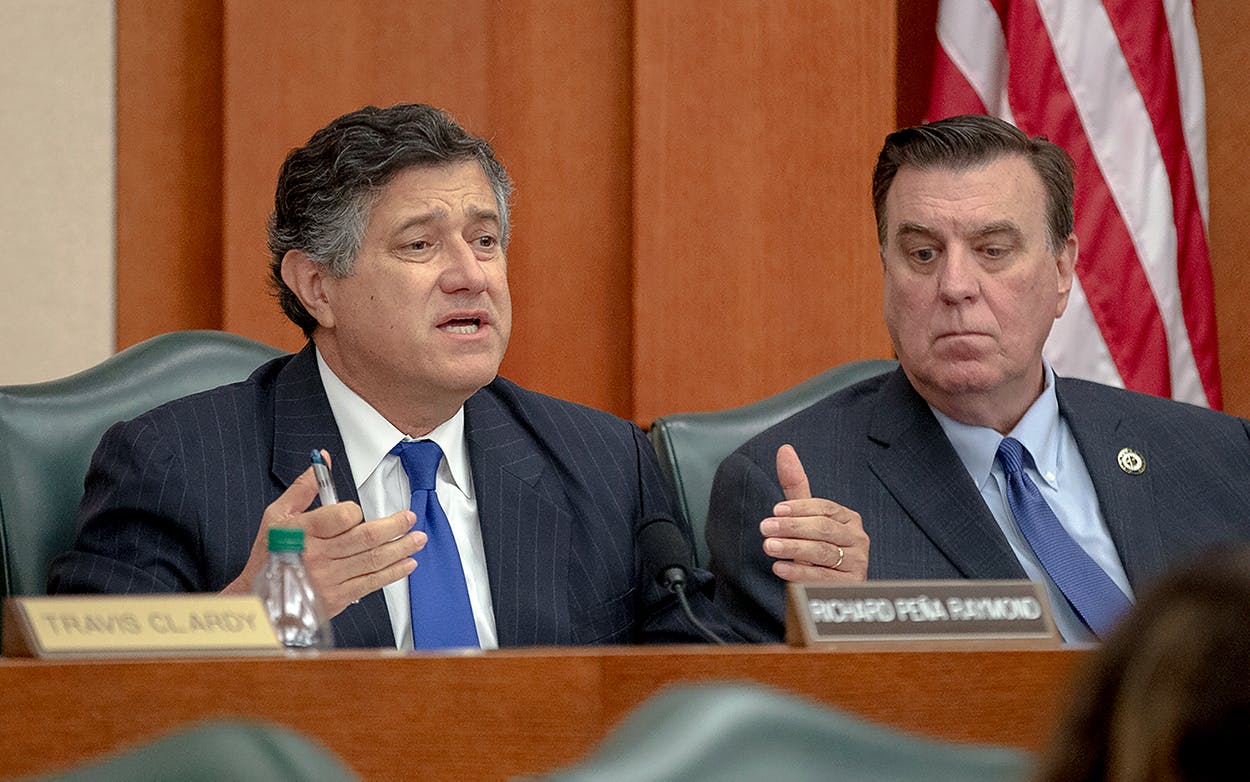Borrowing a favored Republican tactic, a veteran Democratic lawmaker is urging the state of Texas to sue the federal government over the state’s border security expenditures. On the face of it, Representative Richard Raymond’s call makes sense. Republicans for years have complained that the federal government isn’t doing enough to secure the border, forcing Texas to spend at least $2.4 billion and counting to launch its own seemingly never-ending operation in the borderlands. Many local governments and charities are also struggling to meet the needs of children and families who have come to Texas to seek refuge from poverty, violence, oppression, and climate change in Central America and beyond.
Since 2008, when Barack Obama was elected president, the state of Texas has sued the federal government more than sixty times and taken at least six cases to the U.S. Supreme Court. The pace of the lawsuits didn’t slow when Donald Trump assumed office, although the suits still targeted Obama-era policies.
“I go into the office, I sue the federal government, and I go home,” Greg Abbott once quipped about his tenure as attorney general. Not to be outdone, his successor, Ken Paxton, was celebrated in a song by his wife, state senator Angela Paxton, who declared: “I’m a pistol packin’ mama/and my husband sues Obama.”
Raymond is the second Democrat recently to call for Texas to sue the feds. Earlier this month, state senator Jose Menéndez, D-San Antonio, sent a letter to Paxton asking that the attorney general sue the federal government over the holding of migrant children. “It is your duty and obligation to investigate these deplorable conditions and seek justice for children who are suffering and dying in these federally contracted facilities,” Menéndez wrote.
But while Menéndez seeks litigation to challenge a controversial Trump administration policy, Raymond told Texas Monthly he wants to have a much broader impact—similar in scope to the tobacco lawsuits filed by states in the 1990s. “That was the basis for the tobacco lawsuits: the states were losing billions of dollars,” Raymond said. His hope is that such litigation “would finally move the Congress and the administration to actually try to find reforms.”
Raymond believes the lawsuit could be joined by local entities that have spent money on humanitarian relief. Cities and counties could demonstrate that failed immigration policy has forced them to bear the costs.
The only problem with Raymond’s vision is that it seems to be far-fetched, at least legally speaking.
Denise L. Gilman, a professor at the University of Texas School of Law and the director of its immigration clinic, which represents the interests of migrants, called Raymond’s proposal legally and logically unsound. “Nobody forced the state to make these expenditures,” she said, adding that bad public policy decisions by the state wouldn’t obligate the federal government to reimburse Texas. Another difficulty lies in tying specific state expenditures directly to the federal government’s inaction.
Gilman said local entities may have a better chance of recouping losses because they likely can better demonstrate that the actions of the federal government—in this case, releasing thousands of migrants onto the streets of border towns—had a direct financial impact.
Rob Henneke, general counsel for the conservative think tank Texas Public Policy Foundation, said the state of Texas doesn’t have a legal cause of action. “I agree that it’s a federal responsibility and that the federal government has not done its job,” he said. “But this is a matter for Congress to address, not the courts.”
Neither Abbott’s nor Paxton’s office responded to emails seeking comment on Raymond’s proposal.
Raymond spoke publicly about filing suit during a recent joint hearing of two House committees exploring the implications of the explosion of Central American families seeking asylum. Although not a member of either committee, Raymond sat through the five-hour hearing that took testimony from law enforcement, local elected officials, state regulators, and civil rights attorneys. An hour into the testimony, Raymond asked Steve McCraw, head of the Texas Department of Public Safety, when the state started spending money on border security. McCraw said it began in 2007 with the purchase of a single helicopter to patrol the border.
Raymond estimates that since then the state has spent, on average, about $400 million a year to shore up what local lawmakers and the governor agree is a federal responsibility. Since Abbott became governor in 2015, the state has appropriated $2.4 billion for enhanced border security, all the while decrying the federal government for not doing its job.
The costs of humanitarian relief are also adding up for local governments. At a hearing at the Capitol, Lewis Owens, county judge of Val Verde County—a chunk of arid Southwest Texas that includes Del Rio and a sizable stretch of the border—told lawmakers that migrants are costing his county government about $2,500 a day. Since 2014, when the surge of Central American asylum seekers began, the city of McAllen and several nonprofits have spent more than $1 million to address the needs of migrants. These groups have recovered $400,000 in reimbursements, said U.S. Representative Henry Cuellar, whose district extends to McAllen. The latest spending supplement that Congress passed last month provides for $4.6 billion for border security; $30 million of that is targeted at local reimbursement for migrant assistance. Cuellar held meetings in McAllen and other South Texas cities last week to explain how local entities can request some of this $30 million.
- More About:
- Politics & Policy
- Ken Paxton
- Greg Abbott






